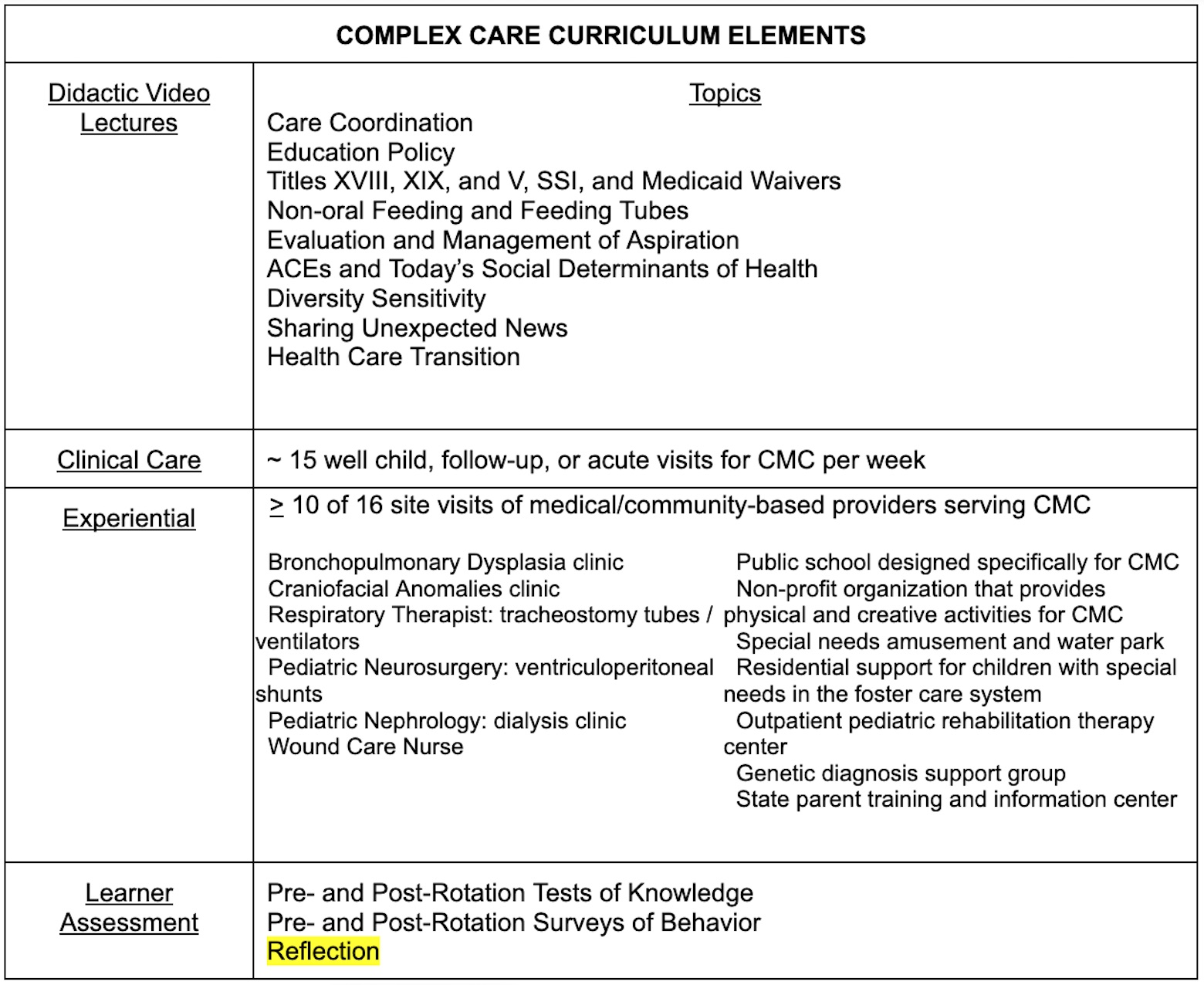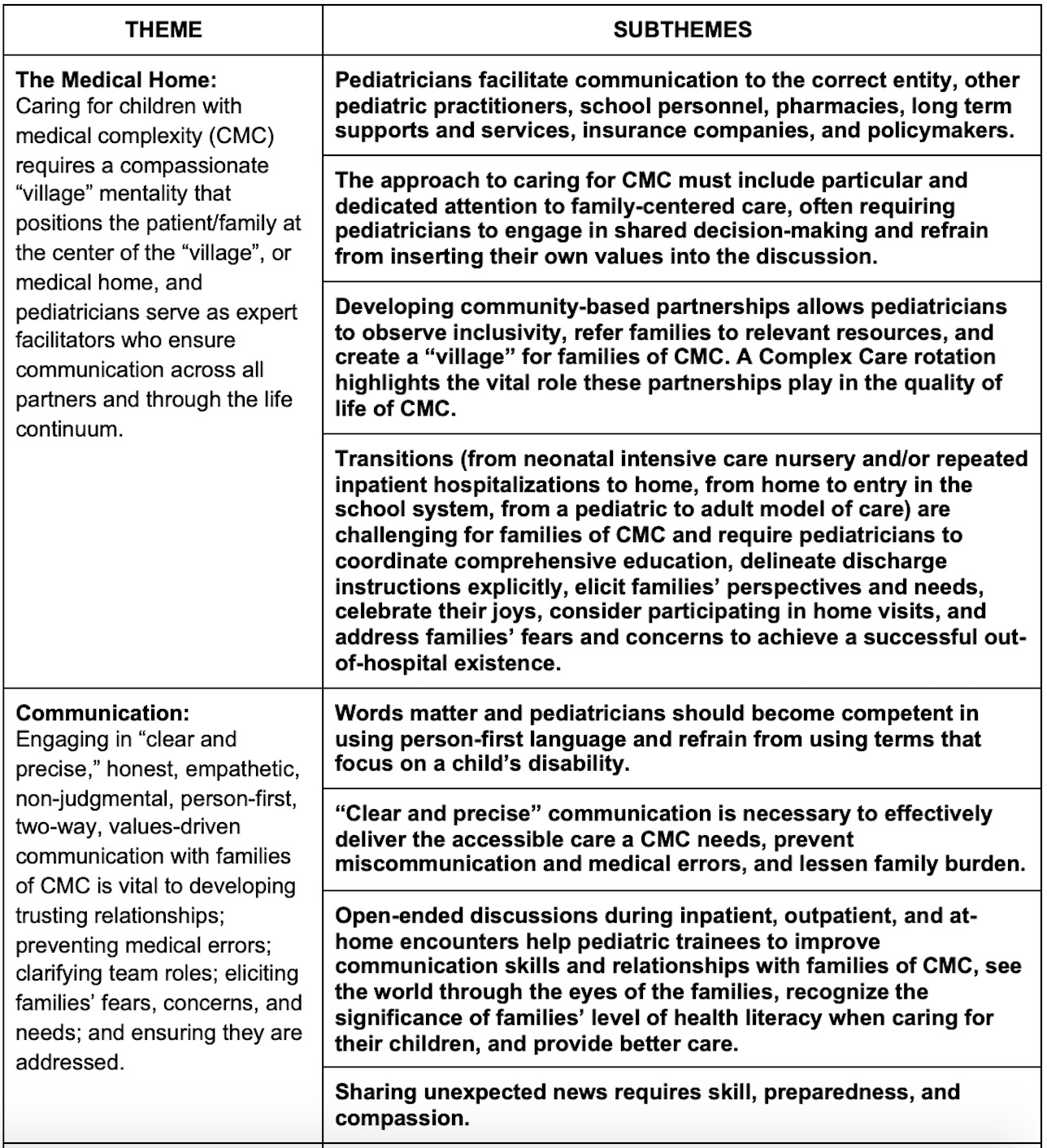Back
Children with Chronic Conditions
Category: Abstract Submission
Children with Chronic Conditions IV
611 - Pediatric Resident Perceptions of a Multi-faceted Complex Care Rotation: A Qualitative Content Analysis
Monday, April 25, 2022
3:30 PM – 6:00 PM US MT
Poster Number: 611
Publication Number: 611.404
Publication Number: 611.404
Tanuja Kothinti, University of South Florida, Tampa, FL, United States; Jacqueline Battistelli, Uniformed Services University of the Health Sciences F. Edward Hebert School of Medicine, San Antonio, TX, United States; Ruchi Kaushik, Baylor College of Medicine, Children's Hospital of San Antonio, San Antonio, TX, United States
.jpg)
Ruchi Kaushik, MD MEd MPH
Medical Director of Education and Research
Imagine Pediatrics
Bellaire, Texas, United States
Presenting Author(s)
Background: Pediatric residents typically do not receive formal training in the care of children with medical complexity (CMC) in a medical home setting. Recently an expert panel developed 11 Complex Care entrustable professional activities (EPAs). Interest and momentum in the design of Complex Care curricula to achieve these EPAs is building; however, an understanding of which facets of such a curriculum are effective has yet to be determined.
Objective: To conduct a qualitative content analysis of pediatric resident perceptions of a multi-faceted Complex Care rotation.
Design/Methods: Pediatric residents opting to participate in a four-week Complex Care rotation engaged in didactic, clinical, and experiential training. Upon rotation completion residents wrote a one-page Reflection to describe which curricular elements they found most impactful and likely to inspire behavior change. We collected Reflections electronically and, using Dedoose, 3 co-authors individually reviewed Reflections and created and revised a codebook; 2 co-authors individually identified themes and sub-themes, met to resolve disagreement, and confirmed agreement with the third co-author through an iterative process.
Results: Of 47 trainees who participated in the rotation, 34 completed Reflections. Five themes emerged: The Medical Home–Caring for children with medical complexity (CMC) requires a compassionate “village” mentality that positions the patient/family at the center of the “village”, or medical home, and pediatricians serve as expert facilitators who ensure communication across all partners and through the life continuum; Communication–Engaging in “clear and precise,” honest, empathetic, non-judgmental, person-first, two-way, values-driven communication with families of CMC is vital to developing trusting relationships; preventing medical errors; clarifying team roles; eliciting families’ fears, concerns, and needs; and ensuring they are addressed; Education–A Complex Care rotation teaches knowledge, skills, and attitudes from a unique outpatient, primary care perspective; Advocacy–Caring for CMC requires advocacy beyond the hospital/clinic room by collaborating across spheres; and Humanism–All children’s lives have meaning and purpose; bearing this in mind helps residents reconnect with humanism.Conclusion(s): Analysis of resident Reflections upon completion of a Complex Care rotation reveals insightful perceptions of its educational value. Emergent themes align with those of families of CMC and with leaders in pediatric Complex Care and graduate medical education and inform future design of Complex Care curricula.
Complex Care Curriculum Elements
Pediatric Resident Complex Care Rotation Themes and Subthemes (Themes 1-2)
(Themes 1-2)
Objective: To conduct a qualitative content analysis of pediatric resident perceptions of a multi-faceted Complex Care rotation.
Design/Methods: Pediatric residents opting to participate in a four-week Complex Care rotation engaged in didactic, clinical, and experiential training. Upon rotation completion residents wrote a one-page Reflection to describe which curricular elements they found most impactful and likely to inspire behavior change. We collected Reflections electronically and, using Dedoose, 3 co-authors individually reviewed Reflections and created and revised a codebook; 2 co-authors individually identified themes and sub-themes, met to resolve disagreement, and confirmed agreement with the third co-author through an iterative process.
Results: Of 47 trainees who participated in the rotation, 34 completed Reflections. Five themes emerged: The Medical Home–Caring for children with medical complexity (CMC) requires a compassionate “village” mentality that positions the patient/family at the center of the “village”, or medical home, and pediatricians serve as expert facilitators who ensure communication across all partners and through the life continuum; Communication–Engaging in “clear and precise,” honest, empathetic, non-judgmental, person-first, two-way, values-driven communication with families of CMC is vital to developing trusting relationships; preventing medical errors; clarifying team roles; eliciting families’ fears, concerns, and needs; and ensuring they are addressed; Education–A Complex Care rotation teaches knowledge, skills, and attitudes from a unique outpatient, primary care perspective; Advocacy–Caring for CMC requires advocacy beyond the hospital/clinic room by collaborating across spheres; and Humanism–All children’s lives have meaning and purpose; bearing this in mind helps residents reconnect with humanism.Conclusion(s): Analysis of resident Reflections upon completion of a Complex Care rotation reveals insightful perceptions of its educational value. Emergent themes align with those of families of CMC and with leaders in pediatric Complex Care and graduate medical education and inform future design of Complex Care curricula.
Complex Care Curriculum Elements

Pediatric Resident Complex Care Rotation Themes and Subthemes
 (Themes 1-2)
(Themes 1-2)